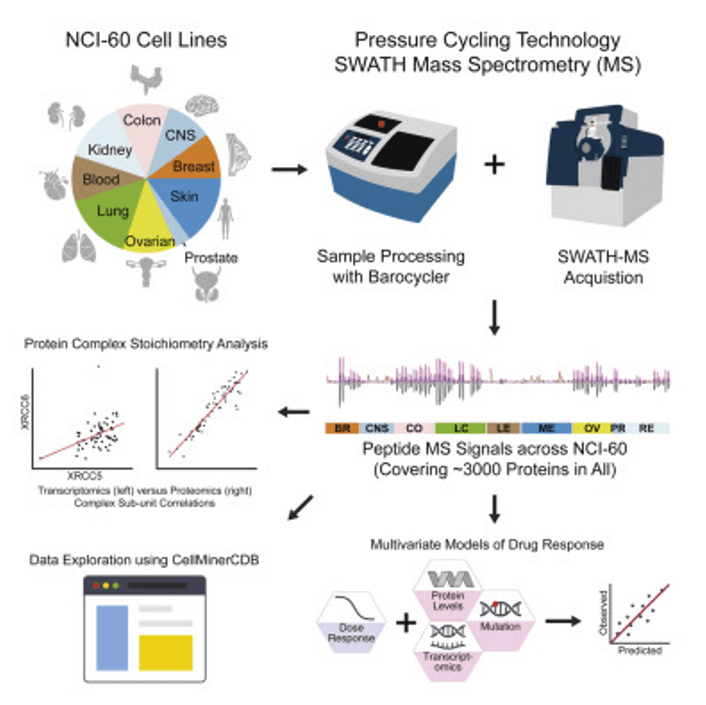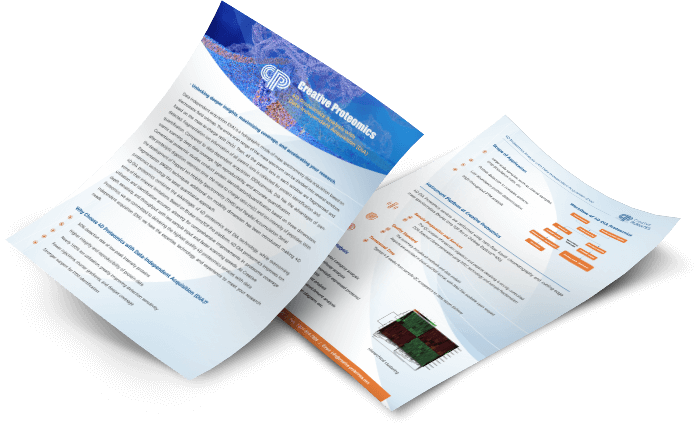PCT-DIA Services
Pressure Cycle Technology (PCT) minimizes sample pre-treatment steps and minimizes sample loss for low volumes of valuable samples, while the DIA technique has no throughput limitations and can be used for large-scale sample volume detection. The combination of these two technologies (PCT-DIA) enables proteomic analysis of paraffin/formaldehyde treated tissue samples and microsamples. With high throughput, stability, speed and accuracy, our PCT-DIA service can solve the technical difficulties of microsamples analysis. After proteomics testing, if you want further result validation, the efficient PRM technology is worth your attention.
 Workflow of PCT-DIA
Workflow of PCT-DIA
Principle of DIA
A MS/MS spectra library is first established using conventional DDA MS techniques, followed by MS data acquisition using the DIA method, thereby enabling the quantification of proteins in the sample.
Different from the traditional DDA technology, the DIA technology divides the entire full scan range of the mass spectrometer into several windows, and then selects, fragments, and detects all ions in each window at a high speed and cyclically, so that all the ions in the sample can be obtained without omission. Therefore, the DIA technology is more suitable for protein detection with a sample of large size and complex systems.
Advantages of DIA:
Compared with the traditional iTRAQ/TMT/Label-free proteomics technology, DIA technology has the following advantages:
1. Ensure data integrity with few missing values.
2. Overcome the limitation of low throughput of iTRAQ/TMT.
3. Improve the detection rate of low abundance proteins.
4. Based on Thermo Fisher's QE-HF high-end mass spectrometry, the detection rate can be improved by more than 20%.
Introduction to PCT
PCT is a sample proteomic processing technique that promotes and accelerates proteolysis by inducing matrix and protein solubilization of samples through programmed periodic shifts between ultrahigh pressure and ambient pressure. For clinical samples, PCT is characterized by speed, low loss, simple operation and high reliability and can also inactivate potentially infectious microorganisms.
Advantages of PCT:
1. Compatible with special, precious and micro samples: paraffin-embedded samples (1mg), formaldehyde fixed samples (1mg), clinical biopsy samples (1mg), micro cell samples (500,000), pollen/fish fry (1mg), etc.
2. High efficiency of enzymatic digestion.
3. Low loss: the yield of PCT treatment of 1mg sample (e.g. mouse liver) is 40% higher than that of traditional methods.
4. Simple operation: nearly 10 steps less than the traditional sample processing method, the instrument operation is simple, and low error.
5. High reliability: Barocycle (ultra-high-pressure cycle crusher) control, effectively reducing operational errors.
Sample Requirements:
| Samples type | # of Cells | Puncture sample | Fresh tissue | FFPE slices |
| Quantify | >5×105 cells | ≥1-2 mg | ≥1-2 mg | 9 slices/sample (10um,≥1 mg) |
Report:
- Experimental steps
- Relevant experiment parameters
- Mass spectrometry spectra
- Raw data
- Proteomics analysis results
In 2018, Nature listed SWATH as one of the most noteworthy biotechnologies. We have also established a very efficient standardized process for PCT-SWATH/DIA, which can obtain information of large-scale cohort clinical samples and transform the assay information into big data by high-throughput PCT-SWATH/DIA technology.
* For Research Use Only. Not for use in the treatment or diagnosis of disease.

 Workflow of PCT-DIA
Workflow of PCT-DIA
 4D Proteomics with Data-Independent Acquisition (DIA)
4D Proteomics with Data-Independent Acquisition (DIA)